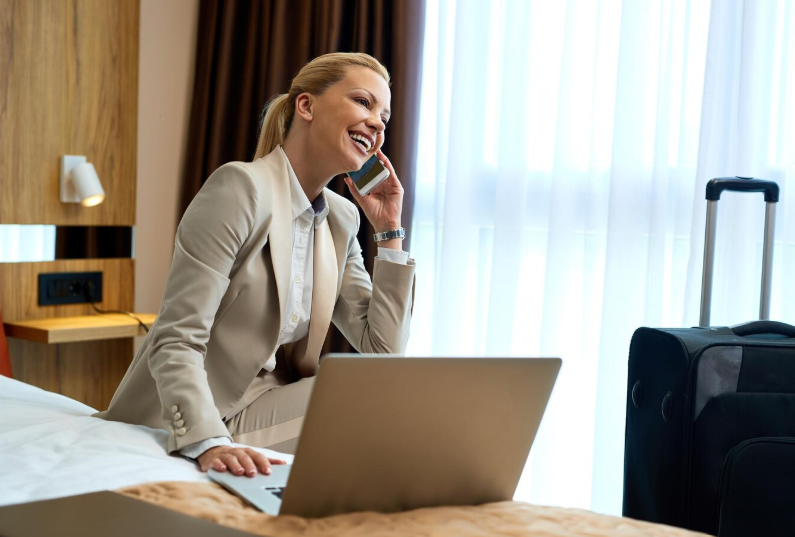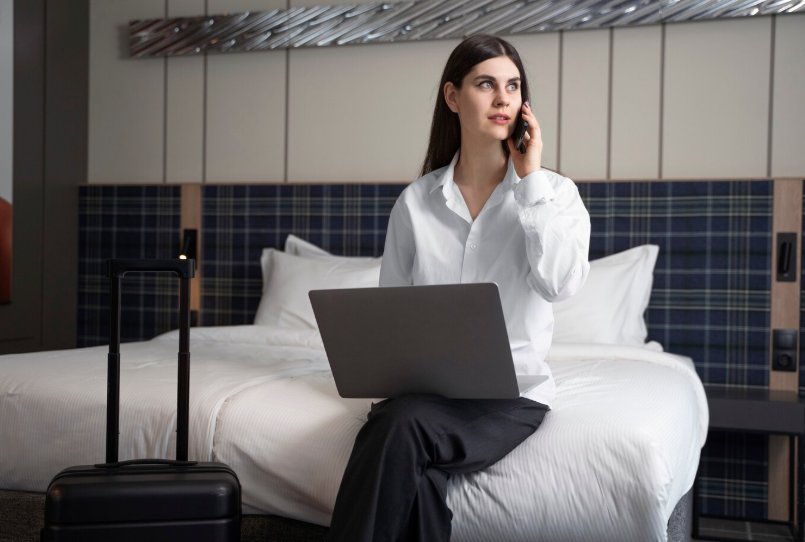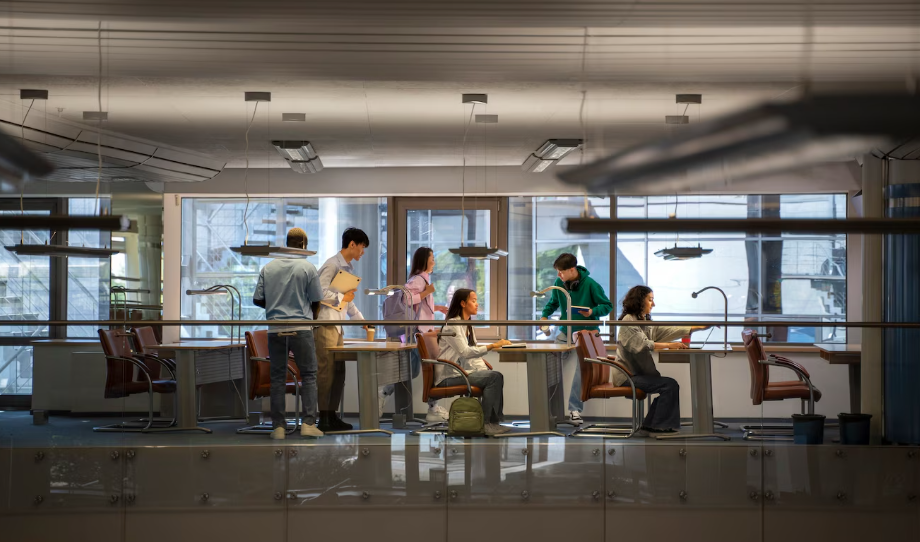
by Dulce Navarro | Jul 29, 2025 | Business, Countries, Europe, Luxury, Travel, Work
Paris Hotels with Fast Wi-Fi, Desks, and Business Services
Paris is known for its romantic boulevards, rich history, and iconic cuisine—but it’s also a prime destination for business travelers and digital nomads. Whether you’re visiting for a corporate event or working remotely as an expat, having access to fast Wi-Fi, ergonomic desks, and professional business services is essential. Fortunately, many Paris hotels cater to the modern working professional by combining style and comfort with state-of-the-art amenities.
1. Hotel Le Roch – 1st Arrondissement
Located just steps away from Place Vendôme and the Louvre, Hotel Le Roch offers a serene environment for productivity. Each room is designed with a contemporary yet elegant flair and includes comfortable work desks and lightning-fast fiber optic Wi-Fi. The hotel also features a stylish lounge and meeting room, ideal for client meetings or virtual calls. Their concierge can assist with printing and courier services, making it an excellent option for executives on the go.
2. Pullman Paris Tour Eiffel – 15th Arrondissement
Few hotels combine business and sightseeing like the Pullman Paris Tour Eiffel. This sleek, modern property sits right at the base of the Eiffel Tower, giving business travelers unparalleled views during Zoom meetings. Every room includes a large workstation, fast and stable Wi-Fi, and a Nespresso machine for a quick caffeine boost. The hotel offers 23 modular meeting rooms and a 24/7 business center, ideal for larger business delegations or workshops.
3. Hotel Molitor Paris – MGallery Collection
If you’re looking to blend business with wellness, the Molitor Paris provides both. Known for its historic art deco swimming pool, this hotel also features premium high-speed internet, spacious rooms with dedicated workspaces, and several meeting rooms equipped with audiovisual technology. For those long workdays, their wellness center offers relaxation treatments that help reset your mind for the next project.
4. Hotel Monge – Latin Quarter
Located in the historic Latin Quarter, Hotel Monge is a boutique hotel offering charm and convenience. Though smaller in size, the rooms are well-equipped with ergonomic desks and high-speed Wi-Fi. The staff is known for going above and beyond, including helping with printing or arranging transport to meetings. If you’re staying long-term, the quiet atmosphere and cultural richness of the area offer a balanced work-life experience.
5. Renaissance Paris Republique Hotel – 10th Arrondissement
Designed with business travelers in mind, the Renaissance Paris Republique Hotel features industrial-chic décor with soundproofed rooms, full-sized desks, and blazing fast internet. The on-site restaurant is perfect for casual business lunches, and the hotel offers flexible coworking spaces along with private meeting rooms for more formal gatherings. It’s conveniently located near the Gare du Nord, making it ideal for international arrivals.
6. CitizenM Paris Gare de Lyon
For tech-savvy professionals on a budget, CitizenM provides smart luxury. With wall-to-wall windows, MoodPads for room control, and ultra-fast free Wi-Fi, the hotel is built for efficiency. Their 24/7 canteenM and working lounge offer a co-living vibe perfect for solo professionals who enjoy communal atmospheres. It’s also walking distance from the Gare de Lyon, which connects easily to business hubs across France.
7. Sofitel Paris Arc de Triomphe
If you’re after luxury and seamless business support, the Sofitel Paris Arc de Triomphe delivers. Featuring plush rooms with large work desks, high-speed Wi-Fi, and 24-hour room service, it’s a favorite among corporate travelers. Their business center offers translation, printing, and presentation services. Plus, its proximity to the Champs-Élysées offers a polished setting for entertaining clients.
8. Hotel Ekta – For Style-Conscious Professionals
Steps from Avenue George V, Hotel Ekta is fashion-forward and ideal for creative professionals. While smaller in scale, the hotel provides fast, reliable internet and in-room desks. The staff is attentive and offers concierge services that include business assistance and courier handling. It’s a great option for entrepreneurs or digital nomads who prefer boutique style with practical amenities.
Choosing the Right Hotel for Business Travel in Paris
When selecting a hotel for business in Paris, consider these three essentials:
- Wi-Fi Speed and Stability: Check if the hotel offers fiber optic internet or has business-grade connectivity.
- Work-Friendly Rooms: Ensure the rooms have proper desks, good lighting, and quiet surroundings.
- Business Support: Look for hotels that offer printing, meeting spaces, and flexible check-in/out options.
Each hotel listed above offers a unique blend of convenience and style, allowing you to stay productive without sacrificing the Parisian experience.
Learning New Languages as an Expat: Strategies for Quick Success
Being a business traveler or expat in Paris means more than checking into the right hotel—it also means learning to navigate a new culture. Picking up French can elevate your local experience, open up professional opportunities, and help you connect authentically with locals.
Here are a few quick strategies for success:
- Immerse Yourself Daily: Change your phone and apps to French, listen to French podcasts, and practice in cafés or shops.
- Use Language Apps with Native Audio: Apps like Babbel, Duolingo, and Pimsleur emphasize pronunciation and real dialogue.
- Hire a Local Tutor: Personalized lessons accelerate learning and can help you master specific vocabulary, like business or medical terms.
- Join Language Meetups: Paris has a vibrant expat and language exchange community. Practice with locals or fellow learners.
- Stay Consistent: Daily practice, even for 10–15 minutes, will build retention and confidence over time.
Whether you’re in Paris for a month or making it your new home, learning the language is a rewarding part of the journey.
Stay Connected for More Travel and Lifestyle Inspiration. For more insights into travel, culture, and lifestyle tips, follow me on @salvadorordorica. If you’re seeking professional translation and localization services to enhance your global ventures, visit The Spanish Group — your trusted partner in bridging cultures worldwide.

by Dulce Navarro | Jul 25, 2025 | Business, Countries, Europe, Luxury, Travel, Work
Coworking-Friendly Hotels in Paris for Digital Nomads and Business Travelers
Paris is more than just a cultural capital and romantic getaway — it’s also one of Europe’s most dynamic hubs for business travelers and digital nomads. With an increasing number of professionals choosing to work remotely or on-the-go, the demand for coworking-friendly hotels has never been higher. These innovative accommodations offer not only comfort and convenience but also the professional infrastructure necessary for productivity, networking, and creativity.
Why Choose a Coworking-Friendly Hotel?
Unlike traditional hotels, coworking-friendly hotels cater specifically to the needs of traveling professionals. These properties typically feature high-speed Wi-Fi, ergonomic workspaces, meeting rooms, and even networking events — all integrated within a stylish, often boutique, environment. Choosing one of these hotels ensures you can stay focused on your work without sacrificing your travel experience.
Top Coworking-Friendly Hotels in Paris
1. CitizenM Paris Gare de Lyon
CitizenM offers a seamless blend of modern comfort and professional amenities. With ultra-fast Wi-Fi, stylish work areas, and 24/7 access to coffee and food, it’s a favorite among remote workers. The hotel’s open-plan lobby also serves as a coworking lounge, with plenty of outlets and comfortable seating. Its central location by Gare de Lyon makes travel across Paris (and beyond) effortless.
2. Mob Hotel – Saint Ouen
Mob Hotel is designed for creatives and entrepreneurs. With organic food, a lively rooftop, and dedicated coworking areas, it offers a laid-back but inspiring atmosphere. The hotel also hosts workshops, film screenings, and networking events, making it perfect for digital nomads looking to connect with like-minded individuals.
3. Okko Hotels Paris Gare de l’Est
Okko Hotels redefines business travel with its all-inclusive approach. Guests enjoy access to “The Club,” a modern communal space perfect for working or relaxing. Complimentary snacks, soft drinks, and evening aperitifs create a welcoming ambiance for informal networking or solo productivity. Located steps from Gare de l’Est, it’s ideal for business travelers needing quick transit access.
4. Hotel La Planque
For a quieter, more boutique experience, Hotel La Planque in the 10th arrondissement offers cozy interiors and a charming garden. While it’s not a traditional coworking hotel, its intimate ambiance and free high-speed Wi-Fi make it a peaceful place to work. The friendly staff and welcoming common areas encourage productivity without the corporate vibe.
5. The Hoxton, Paris
Located in the heart of the 2nd arrondissement, The Hoxton is a favorite among international creatives. It features vibrant common areas, private meeting rooms, and a chic coworking space called “Rivié.” With its trendy restaurant, courtyard, and cultural programming, The Hoxton is ideal for blending business and lifestyle during your Parisian stay.
Features to Look for in a Coworking Hotel
When selecting the right coworking-friendly hotel in Paris, consider these important features:
- Reliable and Fast Wi-Fi: Essential for video calls, large file uploads, and uninterrupted workflow.
- Comfortable Workspaces: Ergonomic chairs, large desks, good lighting, and quiet zones.
- Meeting Facilities: Access to private rooms or spaces for Zoom calls and in-person meetings.
- 24/7 Access: Flexibility is key for international professionals managing different time zones.
- Community and Networking Events: Some hotels host mixers, talks, or workshops — great for meeting other travelers or potential collaborators.
The Ideal Setup for Digital Nomads
Digital nomads seek more than just a place to stay — they want a base that fosters productivity, creativity, and balance. In Paris, these coworking-friendly hotels often combine stylish design with functionality, ensuring you don’t have to sacrifice work efficiency while enjoying everything the city has to offer.
Many hotels partner with local coworking brands or offer discounted access to nearby spaces, expanding your working options while on the move. Whether you’re closing a deal, launching a product, or managing remote teams, these hotels support your professional needs while immersing you in the Parisian lifestyle.
Learning New Languages as an Expat: Strategies for Quick Success
Living and working abroad isn’t just about logistics — it’s about integration. For digital nomads and expats in Paris, learning French can dramatically improve both your personal and professional experience. Here are a few effective strategies to master the language faster:
- Immerse Yourself: Use French in daily interactions — order food, ask for directions, or join a local gym.
- Use Language Apps: Tools like Duolingo, Babbel, or Memrise offer flexible, on-the-go learning tailored for busy professionals.
- Watch and Listen: Watch French TV shows with subtitles and listen to French podcasts or music to develop comprehension and accent familiarity.
- Join Conversation Groups: Attend language exchange meetups or online groups to practice speaking in a supportive environment.
- Hire a Tutor: Even one or two sessions per week with a local teacher can accelerate your confidence and progress.
Mastering the local language not only makes daily life smoother, but it also opens up deeper cultural understanding and connection — key elements to feeling at home in any city.
Stay Connected for More Travel and Lifestyle Inspiration. For more insights into travel, culture, and lifestyle tips, follow me on @salvadorordorica. If you’re seeking professional translation and localization services to enhance your global ventures, visit The Spanish Group — your trusted partner in bridging cultures worldwide.

by Dulce Navarro | Jul 23, 2025 | Business, Countries, Europe, Housing, Lifestyle, Travel, Work
Where to Stay in Paris for Business: Best Neighborhoods and Hotels
Paris is more than just a city of romance—it’s one of the world’s premier business hubs, attracting professionals from finance, fashion, tech, and beyond. For business travelers and expats, finding the right place to stay in Paris can mean the difference between a chaotic commute and a productive, enjoyable experience. Whether you’re visiting for meetings or planning an extended stay, choosing the right neighborhood and hotel is crucial. This guide highlights the top areas to stay in Paris for business and the best hotels that combine convenience, comfort, and professional amenities.
1. 8th Arrondissement – Champs-Élysées & Madeleine
As the center of high-end commerce and corporate headquarters, the 8th arrondissement is a prime location for business travelers. It offers proximity to major firms, embassies, and banking institutions, with convenient access to metro lines and transportation.
Top Hotels:
- Le Bristol Paris: A luxury hotel offering elegant meeting rooms, fine dining, and world-class service. Its business-friendly atmosphere is perfect for executives.
- Hôtel Barrière Le Fouquet’s: Positioned near the Champs-Élysées, it blends Parisian charm with modern business facilities, including private lounges and concierge services.
2. La Défense – Paris’s Business District
La Défense is the city’s financial and corporate hub, home to international conglomerates and sleek skyscrapers. It’s ideal for professionals attending conferences, corporate events, or working with multinational firms. Though just outside central Paris, it’s well-connected by the RER A and Line 1.
Top Hotels:
- Pullman Paris La Défense: A modern hotel equipped with high-speed internet, meeting rooms, and excellent public transport access.
- Sofitel Paris La Défense: Combines business utility with luxury, offering spacious rooms, fitness facilities, and multilingual staff.
3. 1st Arrondissement – Louvre & Palais Royal
For those seeking a central location with historic charm and access to government offices and major corporations, the 1st arrondissement is a solid choice. It’s also close to iconic landmarks, allowing you to balance work and leisure.
Top Hotels:
- Hotel Regina Louvre: An elegant and sophisticated choice just across from the Louvre, ideal for business professionals seeking convenience and style.
- Maison Albar Hotels Le Pont-Neuf: A boutique hotel offering modern amenities in a classic Parisian setting.
4. 7th Arrondissement – Eiffel Tower & Government Offices
The 7th arrondissement is ideal for those in diplomatic or governmental sectors. It’s home to many embassies and ministries, with tranquil streets and refined accommodation options.
Top Hotels:
- Le Cinq Codet: A chic, five-star hotel offering a peaceful retreat with modern meeting facilities and a central location.
- Hotel Montalembert: Combines boutique luxury with excellent service, making it a great choice for professional stays.
5. 2nd Arrondissement – The Financial Core
The 2nd arrondissement houses the Paris Stock Exchange and many startups, tech firms, and international offices. With its vibrant coworking spaces and central location, it’s especially attractive to entrepreneurs and digital nomads.
Top Hotels:
- Hotel Square Louvois: A hidden gem with elegant rooms, wellness amenities, and business-friendly services.
- Hôtel Edouard 7: Offers a balance of sophistication and practicality, with personalized service for business travelers.
Tips for Choosing the Right Business Hotel in Paris
When booking a business hotel in Paris, consider more than just the star rating. Look for:
- Proximity to public transport – Metro and RER lines make navigating Paris efficient.
- Business amenities – High-speed Wi-Fi, meeting rooms, business centers, and concierge support are essential.
- Room comfort – After a long day, a quiet, comfortable room with workspace makes a difference.
- Dining and services – On-site restaurants, in-room dining, laundry, and multilingual staff are a bonus.
Learning New Languages as an Expat: Strategies for Quick Success
Relocating to Paris for business or long-term projects often means adapting to a new language and culture. For non-French speakers, the transition can feel daunting, but with the right mindset and tools, language acquisition can be both efficient and enjoyable.
Here are a few strategies to help you learn French quickly as an expat:
- Immerse yourself: Spend time in local cafes, markets, and public spaces. Listening and observing native speakers accelerates learning.
- Take structured lessons: Enroll in a language school or hire a tutor. Structured learning gives you a strong foundation in grammar and vocabulary.
- Use mobile apps: Tools like Duolingo, Babbel, and Rosetta Stone help you learn on the go and keep skills sharp.
- Practice with locals: Join meetups or language exchange groups. Conversation is key to fluency.
- Be patient and consistent: Fluency doesn’t come overnight, but daily effort produces visible results in a matter of weeks.
Learning French not only enhances your daily life—it opens doors to deeper connections, better work performance, and a more enriching experience in France.
Stay Connected for More Travel and Lifestyle Inspiration. For more insights into travel, culture, and lifestyle tips, follow me on @salvadorordorica. If you’re seeking professional translation and localization services to enhance your global ventures, visit The Spanish Group — your trusted partner in bridging cultures worldwide.

by Dulce Navarro | Jul 22, 2025 | Business, Countries, Europe, Lifestyle, Luxury, Travel, Work
Top 7 Business Hotels in Paris for Productive Work Trips
Paris is not only a global hub of culture and elegance but also a key center for international business. Whether you’re attending conferences, meeting clients, or managing operations abroad, choosing the right accommodation can significantly impact your productivity and overall travel experience. Here are seven top-rated business hotels in Paris designed to support your success during work trips.
1. Le Roch Hotel & Spa
Located between the Louvre and the Opéra Garnier, Le Roch Hotel & Spa is a boutique business hotel with a distinctly Parisian feel. It features high-speed Wi-Fi, a comfortable co-working lounge, and elegant meeting spaces. The hotel’s wellness amenities, including a spa and indoor pool, offer perfect downtime after a busy day of meetings.
2. Pullman Paris Tour Eiffel
For those doing business near the Eiffel Tower or in the 15th arrondissement, Pullman Paris Tour Eiffel offers modern facilities with exceptional connectivity. Rooms come equipped with ergonomic workspaces, and the hotel boasts 23 meeting rooms with advanced audiovisual technology. Its proximity to key tourist landmarks also makes it ideal for mixing business with leisure.
3. Four Seasons Hotel George V
This iconic luxury hotel in the heart of the Golden Triangle is a favorite among executives seeking comfort and prestige. The Four Seasons Hotel George V features high-speed internet, a 24-hour business center, and tailored concierge services for corporate guests. With Michelin-starred dining on-site, it’s also a premier spot for hosting high-end business dinners.
4. Hotel du Collectionneur
Situated near the Champs-Élysées, this art deco hotel is ideal for business travelers who value style and functionality. Hotel du Collectionneur provides an Executive Lounge, extensive conference facilities, and fully equipped meeting rooms. Its business-friendly services include private transfers, multilingual staff, and express check-in/check-out options.
5. CitizenM Paris Gare de Lyon
If you’re seeking a modern, tech-savvy experience, CitizenM Paris is an excellent option. Located near one of the city’s major train hubs, this hotel offers fast check-in kiosks, cloud-based room controls, and a 24/7 canteen. It’s especially attractive to digital nomads and corporate teams working on agile projects or attending events across Europe.
6. Sofitel Paris Le Faubourg
Blending luxury with practicality, Sofitel Paris Le Faubourg is just steps away from the Place de la Concorde and Rue du Faubourg Saint-Honoré. The hotel features a dedicated business center, customizable event spaces, and an atmosphere of quiet elegance that makes it perfect for client meetings or executive retreats.
7. Novotel Paris Centre Tour Eiffel
This centrally located hotel offers exceptional value for business travelers. With over 30 meeting rooms and panoramic views of the Seine, Novotel Paris Centre Tour Eiffel is ideal for hosting conferences or team workshops. Amenities like a fitness center, pool, and onsite dining help create a well-balanced work-life environment.
Choosing the Right Hotel for Your Needs
When selecting a business hotel in Paris, consider your schedule, client locations, and desired amenities. Whether you need fast Wi-Fi, private meeting spaces, or proximity to the city’s financial district, these seven hotels provide a range of accommodations to support your productivity and comfort.
Learning New Languages as an Expat: Strategies for Quick Success
Relocating to a new country for business often comes with the challenge of navigating a different language. As an expat in Paris or anywhere else in Europe, developing strong language skills can enhance both your professional relationships and personal experience.
Start Early: Don’t wait until you arrive to begin learning. Apps like Duolingo, Babbel, and Rosetta Stone are excellent for building a foundation.
Take Local Classes: Many cities offer expat-friendly language courses. In Paris, organizations like Alliance Française provide immersive programs tailored to professionals.
Practice Daily: Incorporate the language into your everyday routine—label items in your home, watch local TV shows, or read the news in French.
Network in the Local Language: Attend business mixers or community events where you can practice conversational skills in real scenarios.
Hire a Language Coach: A private tutor can accelerate your progress and focus on business-specific vocabulary.
Mastering the local language not only facilitates smoother communication but also signals respect and commitment to your new cultural environment—both vital for professional growth abroad.
Stay Connected for More Travel and Lifestyle Inspiration. For more insights into travel, culture, and lifestyle tips, follow me on @salvadorordorica. If you’re seeking professional translation and localization services to enhance your global ventures, visit The Spanish Group — your trusted partner in bridging cultures worldwide.

by Dulce Navarro | Jul 15, 2025 | Business, Company, Culture, Europe, Residency, Work
Business Meetings in Spain: Tips for Building Relationships
Spain is a dynamic and influential player in the European and global economy. For business professionals entering the Spanish market, success goes beyond knowledge of the industry—it requires cultural fluency, personal rapport, and an understanding of how relationships drive business outcomes in Spain. If you’re planning to attend meetings or develop partnerships in cities like Madrid, Barcelona, or Valencia, knowing how to approach professional interactions can be a game changer.
Understanding Spanish Business Culture
Spanish business culture emphasizes trust, warmth, and a personal touch. Unlike more transactional cultures, Spanish professionals often want to get to know their counterparts before moving forward with major business decisions. Building a relationship is not just recommended—it’s expected.
Expect meetings to start with casual conversation. While time is valued, Spaniards rarely jump straight to the point. It’s not uncommon to discuss topics such as family, travel, or food before diving into business. This helps establish a sense of mutual respect and comfort that lays the groundwork for long-term cooperation.
Preparing for a Business Meeting in Spain
- Do Your Research: Understand the company’s history, organizational structure, and recent news. It shows professionalism and genuine interest.
- Learn the Basics of Spanish: While many professionals speak English, using key Spanish greetings or phrases shows courtesy and respect.
- Dress Professionally: Spaniards take pride in personal appearance. Opt for smart business attire—conservative and elegant.
- Be Punctual—but Patient: Arriving on time is expected, but don’t be surprised if meetings start a bit late or run over. Flexibility is key.
Effective Communication in a Spanish Business Setting
Spanish communication is often expressive and nuanced. It’s important to pay attention not only to what is said but how it’s said. Body language, tone, and facial expressions all play a part in conveying sincerity and interest.
Here are a few communication tips to keep in mind:
- Speak Clearly and Confidently: Confidence is respected. Avoid being overly aggressive, but present your ideas with clarity and assurance.
- Show Politeness and Professionalism: Use formal titles unless invited to use first names. A respectful tone goes a long way.
- Follow Up: After a meeting, send a concise follow-up email thanking them for their time and outlining any agreed-upon next steps.
Relationship-Building Strategies
Strong relationships are the cornerstone of doing business in Spain. Without mutual trust, it’s difficult to gain traction, no matter how solid your proposal. Here’s how to nurture those connections:
1. Invest Time in Face-to-Face Interactions
In-person meetings, dinners, and networking events are vital. Spaniards value the opportunity to connect on a personal level. Don’t rush the process—authenticity takes time.
2. Show Interest in Their Culture
Demonstrating knowledge or appreciation for Spanish history, art, cuisine, or regional traditions helps build rapport. It shows you’re not just there for business—you’re there to engage meaningfully.
3. Be Transparent and Reliable
Spaniards appreciate transparency and consistency. Follow through on commitments and be honest about expectations. Building trust means delivering on what you promise, every time.
4. Participate in Networking Events
Whether it’s industry conferences or informal mixers, these gatherings can be instrumental in forming long-term partnerships. Spain’s professional circles are tight-knit, and word-of-mouth carries significant weight.
Dining and Social Etiquette
Business meals are common and often take place at lunch rather than dinner. These are important moments to connect personally rather than strictly discuss work.
- Wait for the host to start eating before beginning your meal.
- Avoid discussing business too early in the meal—let the host guide the conversation.
- Don’t rush to leave—meals can be leisurely and are meant to build rapport.
- Be prepared to split the bill unless the host insists otherwise.
Handling Negotiations
Negotiations in Spain can be lengthy, but they are rarely confrontational. Expect indirect communication and a focus on mutual benefit. Don’t push for rapid decisions—Spaniards prefer to weigh their options thoroughly, often consulting colleagues before concluding deals.
It’s also common for decisions to go through multiple levels of management, so patience and persistence are key. Continue to maintain communication and build rapport during the negotiation process.
Learning New Languages as an Expat: Strategies for Quick Success
Living and working in Spain as an expat offers immense opportunities for growth—especially when you make the effort to learn the local language. Here are a few tips for picking up Spanish quickly and effectively:
1. Take Intensive Language Classes
Enroll in language schools or private lessons. Structured learning helps you build a solid foundation in grammar and vocabulary.
2. Immerse Yourself Daily
Practice speaking with locals, watch Spanish television, and read newspapers to reinforce what you’ve learned.
3. Use Language Apps
Apps like Duolingo, Babbel, and Memrise are great tools for building vocabulary and practicing conversational Spanish.
4. Join Language Exchange Groups
Platforms like Meetup offer language exchange events where you can practice Spanish while helping others learn English.
5. Don’t Fear Mistakes
Making mistakes is part of the process. Most locals appreciate the effort and will help you improve. Confidence and consistency are key.
Stay Connected for More Travel and Lifestyle Inspiration. For more insights into travel, culture, and lifestyle tips, follow me on Instagram
@salvadorordorica. If you’re seeking professional translation and localization services to enhance your global ventures, visit
The Spanish Group — your trusted partner in bridging cultures worldwide.

by Dulce Navarro | Jul 15, 2025 | Business, Company, Countries, Culture, Europe, Work
Coworking Spaces in Paris: Top Picks for Remote Professionals
Paris isn’t just the City of Lights—it’s rapidly becoming a global hub for digital nomads, freelancers, and remote professionals. With its seamless blend of history, culture, and cutting-edge innovation, Paris offers more than scenic views and croissants—it delivers world-class coworking environments tailored to today’s mobile professionals. Whether you’re in Paris for a few weeks or planning a longer stay, finding the right coworking space can transform your productivity and professional experience.
Why Choose Coworking in Paris?
Coworking in Paris offers a dynamic environment where creativity, community, and commerce intersect. Remote professionals benefit not only from premium workspaces but also from the cultural richness and connectivity that Paris provides. Most coworking spaces in Paris offer high-speed internet, flexible desk options, networking events, and even wellness amenities. The bilingual nature of many facilities makes it easy for expats and international professionals to integrate smoothly.
Top Coworking Spaces for Remote Professionals in Paris
1. WeWork (Multiple Locations)
WeWork has several strategic locations across Paris, including La Fayette, Champs-Élysées, and Saint-Lazare. Known for its consistent quality and vibrant atmosphere, WeWork offers hot desks, private offices, and conference rooms—perfect for solo professionals or teams. Plus, members gain access to a global network of coworking spaces.
2. Spaces Réaumur
Located in the heart of the 2nd arrondissement, Spaces Réaumur combines stylish interiors with a thriving community of startups, entrepreneurs, and creatives. The facility includes breakout areas, meeting rooms, and a rooftop with spectacular city views. The central location makes it easily accessible by metro and bike.
3. Anticafé (Louvre, Beaubourg, and more)
Anticafé offers a unique coworking model—pay by the hour, and everything else is included: coffee, tea, snacks, and fast Wi-Fi. It’s ideal for freelancers and students who want a cozy yet stimulating environment without long-term commitments. With locations near cultural landmarks, it’s perfect for those wanting to combine work with exploration.
4. Wojo (Gare de Lyon and Locations Throughout Paris)
Wojo blends hotel-level service with the practicality of a professional workspace. Their flexible memberships, high-end design, and focus on wellbeing make it a great fit for consultants, digital creatives, and international remote workers. Daily passes are available, and many locations are open 24/7.
5. Hubsy (République, Saint-Lazare)
Hubsy offers the cozy charm of a Parisian café with the professionalism of a modern office. Their pay-as-you-go coworking model includes unlimited drinks and snacks, with a quiet atmosphere that encourages deep work. Perfect for writers, designers, and anyone needing focused time in a warm environment.
Key Considerations When Choosing a Coworking Space
- Location: Proximity to public transport and vibrant neighborhoods can save time and enhance your experience.
- Amenities: Look for offerings such as ergonomic chairs, phone booths, and printing services.
- Community: Spaces with active event calendars and networking opportunities can open professional doors.
- Flexibility: Choose a coworking model that aligns with your work style—daily passes, part-time memberships, or 24/7 access.
Hidden Gems Worth Discovering
La Permanence
With rates starting as low as €1 per hour, La Permanence is an affordable option for budget-conscious remote workers. Open 24/7, it offers a quiet, no-frills environment ideal for intense study or deep work sessions.
Le Laptop
A favorite among UX designers and digital creatives, Le Laptop offers inspiring interiors and curated community events. Located in the 10th arrondissement, it attracts a crowd focused on innovation and collaboration.
Morning Coworking
Morning Coworking offers various spaces across Paris, including in Montorgueil and Saint-Ouen. Their aesthetically designed workspaces feature natural light, plants, and wellness programming to boost productivity and morale.
Learning New Languages as an Expat: Strategies for Quick Success
Moving to a new country involves more than finding the right place to work—language plays a key role in daily integration and professional success. As an expat in Paris, learning French will greatly enhance your experience and open doors to deeper connections and opportunities.
1. Immerse Yourself
Attend local events, shop in local markets, and practice speaking in everyday situations. Immersion accelerates learning naturally.
2. Take Structured Classes
Enroll in language schools like Alliance Française or take private lessons with a certified tutor. Structured lessons help build grammar and vocabulary fast.
3. Use Language Apps
Duolingo, Babbel, and Tandem can be great for practicing on the go. Many offer conversation exchanges with native speakers.
4. Join Language Meetups
Platforms like Meetup.com host regular language exchange events across Paris, giving you a chance to practice French while helping others with English.
5. Be Patient and Consistent
Language learning is a journey. Celebrate small wins, stay consistent, and don’t be afraid to make mistakes—Parisians appreciate the effort.
Stay Connected for More Travel and Lifestyle Inspiration. For more insights into travel, culture, and lifestyle tips, follow me on Instagram
@salvadorordorica. If you’re seeking professional translation and localization services to enhance your global ventures, visit
The Spanish Group — your trusted partner in bridging cultures worldwide.






